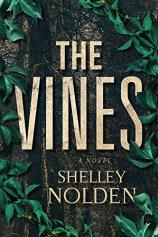Reading Group Guide
Discussion Questions
The Vines

1. The Gettlers justify their experimentation on Cora as being “for the greater good.” If THE VINES were nonfiction, and Cora’s suffering had the potential to result in a universal vaccine to prevent or stop all the deaths and misery from COVID-19, would you support the Gettlers’ efforts? What if your child had a rare illness that Cora’s antibodies could cure?
2. With periods of being utterly and profoundly alone on North Brother Island, always having to keep her distance from others, Cora experiences the ultimate isolation. How do you relate to Cora given your own experience during the COVID-19 pandemic?
3. A cancer survivor who constantly worries about disease and death, Lily is a foil to Cora. She has every reason to hate and distrust Cora, and yet, how do you think she measures her personal feelings against Cora’s victimization?
4. Cora hates that the germs live within her; she wants to gouge them free. This emotion was autobiographical for the author, who’d experienced this feeling while battling leukemia. It’s extremely devastating fighting an enemy within oneself. If you or someone you love has done so, what did you call upon within yourself to keep pressing onward with positivity and hope? Did you seek solace or support from others or turn inward?
5. Lily, whose cancer treatments rendered her infertile, refuses to marry Finn because she believes he should have biological children. Would you have taken this same stance if you were Lily? Conversely, if your significant other were unable or unwilling to have children, would you still choose to marry them? How important is passing on your genes in the decision to have children, as it relates to adoption versus other assistive reproductive techniques?
6. THE IMMORTAL LIFE OF HENRIETTA LACKS by Rebecca Skloot grippingly portrays one of the now most famous bioethics and race relations cases of the 20th century. In 1951, cancer cells from African American Henrietta Lacks were cultured into the “HeLa” cell line still used today for medical research and commercial purposes --- without her consent. Neither she nor her family were compensated for the use of her cells. At the time, consent was not required or customary. If you were Henrietta or Cora, and the scientists studying your cells had needed your consent, how much of yourself would you have been willing to share? And at what price?
7. In the United States, the African American community has been subjected to unethical, involuntary medical experimentation. The Tuskegee Study of Untreated Syphilis is the most famous example of this maltreatment but far from the only. How did the color of Cora’s skin impact your reaction to her mistreatment?
8. The repercussions from African Americans’ resulting mistrust in the healthcare system continue today, as many people from this community are leery of the COVID‐19 vaccine despite the pandemic’s disproportionate impact on this population. “Trust” is a major theme in THE VINES. How can the United States’ healthcare system earn back the trust of the African American community?
9. Richard O’Toole references the discrimination his Irish family faced upon arriving in the United States. The majority of those sent to Riverside Hospital in the late 1800s and early 1900s were poor immigrants. What parallels do you see to this moment in the United States, regarding the deep-rooted and institutional inequalities that have been brought to the foreground with urgency?
10. Many people have never heard of the PS General Slocum tragedy. The virulent anti-German sentiment during and following World War I, and then, of course, again during World War II, resulted in this tragedy being largely dismissed and then nearly altogether forgotten. Today in New York City, Little Italy and Chinatown remain, yet there is no Little Germany because the tragedy broke the community. Scapegoating throughout history has had dire results. What parallels do you see in contemporary America?
11. Despite their wrongs, Finn still loves his brother and father and feels guilty for his disloyal acts that help Cora. Even after Kristian reveals how far he’s willing to go for the sake of his scientific objective, Finn can’t bear the thought of him dying. Similarly, despite Sylvia’s activism outside the home, she tolerates Rollie’s unethical actions because she loves him. Has someone you loved ever done something terrible? Do you still love them? How “unconditional” is unconditional love?
12. Finn finds himself in a seemingly untenable position. He loves his mother and would do anything to make her healthy again. But what he discovers that his family has been engaged in to that same end is unthinkable and savage. How does he choose whom to save, and how does one navigate through familial turmoil to stand up for what’s right and fair and decent with such high stakes? How would you handle this haunting dilemma?
13. During the early 1960s, Cora gave Ulrich lists of supplies for him to procure for her. What items would you ask for if you were forced to live alone on North Brother Island, or anywhere? How would you feel about having to survive alone?
14. Do you agree with Cora’s decision to flee North Brother Island with toddler Kristian to keep him with her? How would you weigh the benefits of him growing up in New York City, where he could attend school, have everyday comforts, and form friendships, versus those associated with receiving a mother’s love and care while remaining in isolation with her on the deserted island? Are your heart and head in agreement on your decision? What personal sacrifices have you made for your children or other loved ones?
15. Throughout the decades, Cora repeatedly tries to bolster her inner strength, courage and confidence, only to be knocked down again by the Gettlers. Resilience is a core theme of this book. Knowing Cora as you now do, where do you think her survival instinct and unrelenting unwillingness to surrender come from? Do you think they are related to her upbringing and love of family, or her spirituality, perhaps? Or something else altogether? How do you believe you would fare under these horrific circumstances?
16. The author extensively studied the available online photography of the island, drawing from it both details to include in the setting and plot ideas. Following your own study of the images (a collection of Shelley’s resources can be found on the About North Brother Island page), what were you able to recognize in the photos that appeared in the novel?
17. What would you like to see happen in the sequel?
The Vines
- Publication Date: March 23, 2021
- Genres: Fiction, Historical Fiction, Historical Thriller, Mystery, Suspense, Thriller
- Hardcover: 412 pages
- Publisher: Freiling Publishing
- ISBN-10: 1950948404
- ISBN-13: 9781950948406







